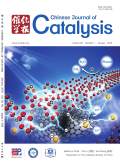CuO调配SnO2表面用于碳烟颗粒燃烧: 单层分散阈值效应对催化性能的影响
基本信息来源于合作网站,原文需代理用户跳转至来源网站获取
摘要:
With the objective to investigate the structure-reactivity relationship of CuO/SnO2 and eventually design more applicable catalysts for soot combustion, catalysts with different CuO loadings have been prepared by impregnation method. By using X-ray diffraction and X-ray photoelectron spec-troscopy extrapolation methods, it is disclosed that CuO disperses finely on the SnO2 support to form a monolayer with a capacity of 2.09 mmol 100 m?2, which equals 4.8 wt% CuO loading. When the CuO loading is below the capacity, it is in a sub-monolayer state. However, when the loading is above the capacity, CuO micro-crystallites will be formed that coexist with the CuO monolayer. The soot combustion activity of the catalyst increases with the CuO loading until it reaches the mono-layer dispersion capacity. A further increase in the CuO loading has no evident influence on the activity. Raman results have testified that with the addition of CuO onto the SnO2 support, a sur-face-active oxygen species can be formed, the amount of which also increases significantly with the increase in the CuO loading until it reaches the monolayer dispersion capacity. Increasing the CuO loading further has no evident impact on the amount of surface oxygen. Therefore, an apparent monolayer dispersion threshold effect is observed for soot combustion over CuO/SnO2 catalysts. It is concluded that the amount of surface-active oxygen sites is the major factor determining the ac-tivity of the catalyst. 摘要: 柴油发动机由于具有良好的动力和经济性等优势而得到广泛的应用, 但排放的尾气中碳烟颗粒物(PM)却给人类健康和环境带来了严重的危害. 目前PM污染的治理引起了广大科研工作者的关注. 催化燃烧成为PM污染消除技术中最有效的方法.
金属氧化物负载到载体上时, 通常会出现单层分散现象, 其单层分散容量可以通过XRD, XPS和Raman等外推法测定.此外, 当负载体系用作某种反应的催化剂时, 往往会表现出单层分散阈值效应, 即阈值附近的催化剂通常具有较高的活性和选择性等. 目前单层分散理论已被广泛接受, 成为设计高性能催化材料的重要指导思想.
在过去八年本课题组将SnO2基催化材料用于多种环保和能源反应, 并系统地探究了其催化性能. 结果表明, SnO2含有丰富的表面活泼氧和晶格氧, 且热稳定性高, 是一种优良的催化剂载体. 基于单层分散理论, 为获得更实用的PM燃烧催化剂, 我们利用浸渍法设计制备了系列不同CuO负载量的CuO/SnO2催化剂, 并使用XRD, XPS, Raman, TEM, STEM-mapping, H2-TPR, soot-TPR和O2-TPD等手段深入研究了其构效关系. 利用XRD和XPS外推法测得的CuO高度分散在SnO2载体表面,其单层分散阈值为2.09 mmol 100 m–2, 即相当于4.8% CuO负载量. 低于该负载量时, CuO以亚单层分散态存在; 而高于该负载量时, 形成的CuO微晶和单层分散态的CuO共存. 在单层分散阈值之前, 催化剂的碳烟燃烧活性随CuO负载量的升高而上升; 进一步提高CuO负载量对其活性无明显的影响. Raman结果表明, 在单层分散阈值之前, CuO负载到SnO2载体上可有效形成表面活泼氧中心, 且其含量随CuO负载量升高而增加; 进一步提高CuO负载量则对其含量无明显改变. 因此, CuO/SnO2催化剂用于碳烟颗粒燃烧具有明显的阈值效应. 以上结果表明, 表面活泼氧中心含量是决定该催化剂活性的主要因素.

推荐文章
空心SnO2纳米球的光催化降解性能
二氧化锡
空心纳米球
光催化
甲基橙
纳米SnO2的表面改性研究
纳米SnO2
表面改性
偶联剂
超声处理
SnO2/ZnO/铝箔复合薄膜的制备及光催化性能研究
溶胶-凝胶法
SnO2/ZnO薄膜
光催化降解
甲基橙
高分散 SnO2纳米粒子的制备及其气敏性能研究?
气体传感器
SnO2
碳微球
乙醇敏感
内容分析
关键词云
关键词热度
相关文献总数
(/次)
(/年)
引文网络
引文网络
二级参考文献 (0)
共引文献 (0)
参考文献 (8)
节点文献
引证文献 (0)
同被引文献 (0)
二级引证文献 (0)
1994(2)
- 参考文献(2)
- 二级参考文献(0)
1999(1)
- 参考文献(1)
- 二级参考文献(0)
2009(1)
- 参考文献(1)
- 二级参考文献(0)
2010(1)
- 参考文献(1)
- 二级参考文献(0)
2014(1)
- 参考文献(1)
- 二级参考文献(0)
2016(2)
- 参考文献(2)
- 二级参考文献(0)
2019(0)
- 参考文献(0)
- 二级参考文献(0)
- 引证文献(0)
- 二级引证文献(0)
研究主题发展历程
节点文献
氧化锡负载的氧化铜
碳烟颗粒燃烧
单层分散
XRD和XPS外推法
阈值效应
研究起点
研究来源
研究分支
研究去脉
引文网络交叉学科
相关学者/机构
期刊影响力
催化学报
主办单位:
中国化学会
中国科学院大连化学物理研究所
出版周期:
月刊
ISSN:
0253-9837
CN:
21-1195/O6
开本:
大16开
出版地:
辽宁省大连市中山路457号(大连110信箱)
邮发代号:
8-93
创刊时间:
1980
语种:
chi
出版文献量(篇)
5062
总下载数(次)
23
总被引数(次)
65041
期刊文献
相关文献
推荐文献
- 期刊分类
- 期刊(年)
- 期刊(期)
- 期刊推荐
力学
化学
地球物理学
地质学
基础科学综合
大学学报
天文学
天文学、地球科学
数学
气象学
海洋学
物理学
生物学
生物科学
自然地理学和测绘学
自然科学总论
自然科学理论与方法
资源科学
非线性科学与系统科学
催化学报2022
催化学报2021
催化学报2020
催化学报2019
催化学报2018
催化学报2017
催化学报2016
催化学报2015
催化学报2014
催化学报2013
催化学报2012
催化学报2011
催化学报2010
催化学报2009
催化学报2008
催化学报2007
催化学报2006
催化学报2005
催化学报2004
催化学报2003
催化学报2002
催化学报2001
催化学报2000
催化学报1999
催化学报2019年第9期
催化学报2019年第8期
催化学报2019年第6期
催化学报2019年第5期
催化学报2019年第4期
催化学报2019年第3期
催化学报2019年第2期
催化学报2019年第12期
催化学报2019年第1期

 免费查重
免费查重










